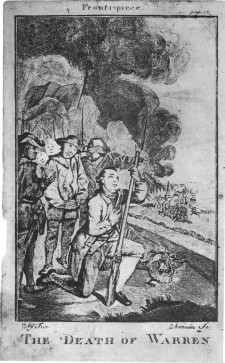Author: [Anonymous]
Date: September 2, 1775
“The death of Dr. Warren, who was killed at Bunker’s Hill on the 17th of June, was occaisioned in the following manner: When the Provincials were retreating in consequence of the three concurring circumstances, Charles Town being on fire, the ships cannonading, and the regulars advancing, the Doctor, with the intrepidity and contempt of danger which peculiarly marked his character, stood alone for some time, endeavoring to rally the troops and animate them by his example : he was observed in this situation, and known by an officer in the regulars, who, wresting a musquet of the hands of one of his men, took aim, and lodged a bullet in his breast, of which he expired without pang.”
Source: London Evening Post, London, September 2, 1775, Issue 8339; Craftsman or Say’s Weekly Journal, London, September 2, 1775, Issue 891, p. 4; and Morning Chronicle and London Advertiser, London, September 2, 1775, Issue 1960, p. 2. 17th-18th Century Burney Collection, Newspapers, British Library
Commentary: This account is somewhat consistent with the forensic evidence, in that the weapon involved may have been an officer’s fusil being held by a batman. As related here, it was grasped by an officer, who recognized Warren, and proceeded to shoot him fatally in the chest. Fusils were light muskets, non-standardized and supplied by the officers themselves, and of notably smaller bore than the .75 caliber Brown Bess infantry muskets. The account diverges from the forensic evidence, as reconstructed by old photographs of Warren’s skull, by stating that Warren was fatally shot in the breast or chest, rather than in the head.
The news article appeared in several London newspapers. We may infer that it reached a significant number of British readers. Such articles appeared with text only as was typical of early newspapers. The engraving by John Norman appeared in America as the frontispiece to Brackenridge’s 1776 patriotic play about the Battle of Bunker Hill

 Follow
Follow